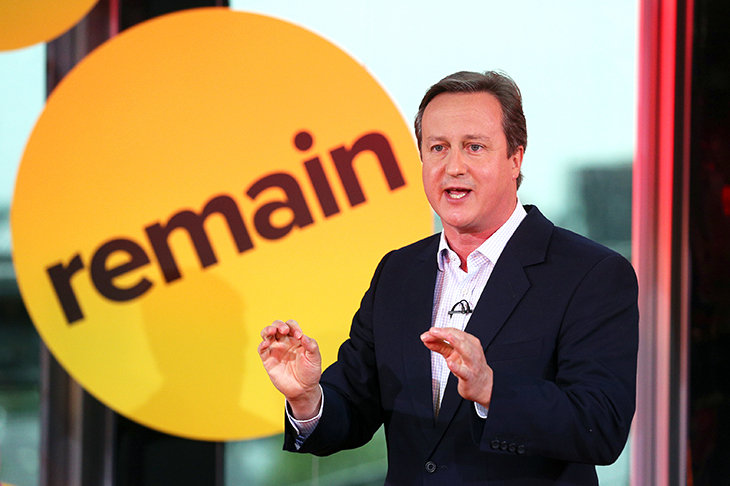Cameron’s fatal error
Sir: Jo Johnson’s otherwise informative review of David Cameron’s For the Record (Books, 12 October) suggests Cameron’s ‘mistake’ was to not call the referendum earlier, and his ‘fatal error’ was his failure to nail down the Leave campaign on how they ‘would actually deliver Brexit’.
Not so. Cameron’s mistake was to assume the referendum would produce a Remain result. Cameron’s fatal error was to have taken sides in the referendum. Had he not taken sides, had he not allowed George Osborne to launch ‘Project Fear’, and had he encouraged the dissemination of practical information for both the Leave and the Remain sides, then after the result he would have been able to initiate a workable withdrawal in an orderly way. Cameron should have admitted his error in backing the losing side, got on with his job and taken the country forward.
There would have been no need for the tenure of Theresa May; there would have been no need for a general election in 2017 — and we would not be where we are now.
Hugh Nowlan
Frome, Somerset
We were not a head of state
Sir: Philip Hensher refers to Margaret Thatcher as a ‘head of state’ (Books, 19 October). No. Our head of state is Her Majesty Queen Elizabeth II. Margaret Thatcher may have begun to think of herself as such (‘We are a grandmother’). But she wasn’t.
Iain McCoubrey
Letcombe Regis, Oxon
Measure for measure
Sir: I suppose it was foolish of me to hope that an increasingly metricated Spectator might resist the relentless drive to make us adapt to the chilly and inhuman Jacobin measurement system. In the end, I suppose, the last hundredweight will be strangled with the intestines of the last furlong, and that will be that. But in the meantime, may I be allowed to mock the contortions which this transition causes? Stephen Bayley, reviewing a life of Frank Lloyd Wright (Books, 19 October), helpfully explains that a skyscraper planned by Wright, ‘Mile High Illinois’, would have been ‘a building 1,600m tall’.
Well, no, actually. From ground to roof it would have been, er, a mile high (5,280 feet, or 1,760 yards, almost 1,610m as it happens). In the same spirit — of letting the Cultural Revolution wash over me, while mocking it — I am looking forward to the inevitable metrication of Shakespeare, in which Hamlet is required to say to Yorick’s skull: ‘Now get you to my lady’s chamber and tell her, let her paint 2.54cm thick, to this favour she must come. Make her laugh at that.’ I will laugh at that.
Peter Hitchens
London W8
Lighten up
Sir: Unlike James Delingpole (‘How I plan to win a Bafta’, 19 October), I am delighted that the BBC and RSC casting policies have revealed that Britain has such a wealth of talented black actors. Now, when the Okonedos, Elbas and Kaluuyas move on to international fame, there is a good new wave to take their place. I can’t see how this is anything but advantageous.
When a black actor is cast in a role written or historically existing as white, it becomes a question of how the character is portrayed. In the BBC’s Les Misérables, which Mr Delingpole refers to, it was clear to me that we were not being given a black Javert, but Javert played by a black actor, and an extremely good one. On the other hand, having Iago played as black in the RSC’s most recent production of Othello added some strength to the motivation — a black soldier passed over in favour of a white soldier by his black commander — and some irony in lines about black rams tupping white ewes.
There are anomalies. ITV’s Victoria put an unfeasibly large number of black Chartists on the London streets, while there were no white extras picking cotton in the fields of 12 Years a Slave. I think that Mr Delingpole, to use an unfortunate phrase given the context, should lighten up.
Frank Startup
Cirencester, Gloucestershire
Dot’s knowledge
Sir: Is there any limit to the range of knowledge that Dot Wordsworth displays? Your picture depicts the traditional figure of a prim academic. Who would imagine she had such a detailed knowledge of American blackjack?
Godfrey Dann
East Grinstead, West Sussex
Crack, please
Sir: It may be too late to halt the progress of the ‘craic’ (a ‘hideous neologism’ according to the late Professor Diarmaid Ó Muirithe of Dublin University), but it was surprising to see it used in The Spectator last week in a letter addressed from Northumberland.
Years ago I read an article in the Observer saying how significant it was that there was no word in English to correspond to the Irish term ‘the craic’. But the crack has for centuries been used from North Yorkshire to Scotland with exactly the same meaning as in the bogus ‘Gaelic’ spelling. I could quote sources from Anne Brontë to my Tyneside grandfathers — who would claim to my grandmothers that they went to the pub ‘for a bit crack’. The Concise Oxford Dictionary defines crack (8) as ‘dial. colloq. conversation; good company; fun’.
Terence Ryle
London NW11
Just right
Sir: Rory Sutherland’s column (Wiki Man, 12 October) reminded me of the man with his feet in the fridge and his head in the oven. On average, his temperature was fine.
Andy Armstrong
Edinburgh
Got something to add? Join the discussion and comment below.
Get 10 issues for just $10
Subscribe to The Spectator Australia today for the next 10 magazine issues, plus full online access, for just $10.
You might disagree with half of it, but you’ll enjoy reading all of it. Try your first month for free, then just $2 a week for the remainder of your first year.














Comments
Don't miss out
Join the conversation with other Spectator Australia readers. Subscribe to leave a comment.
SUBSCRIBEAlready a subscriber? Log in